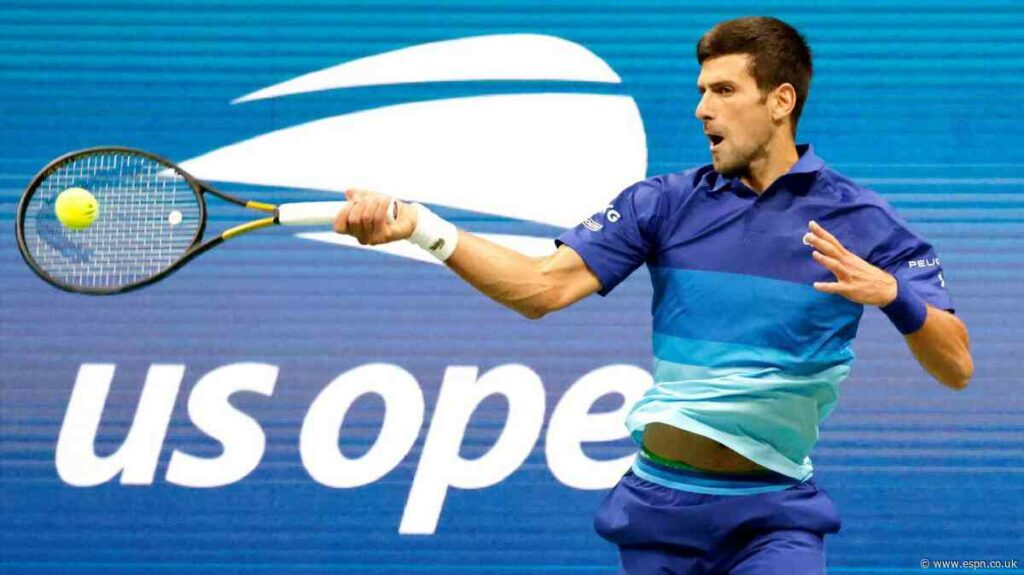How US Open admirers feel about slacking immunization rates in tennis

On Day 1 of the US Open, the first run through in quite a while fans were permitted into the stands at Flushing Meadows, 53,783 individuals strolled through the entryways. Some were covered, some were exposed, yet all going to should have had no less than one portion of the COVID-19 immunization as ordered on Aug. 27 by New York state.
Be that as it may, one gathering didn’t need to go through similar conventions: the players and their groups. Despite the fact that the ATP and the WTA have firmly supported immunizations among competitors, there is no antibody order for competitors to contend at the US Open.
That puts tennis a long ways behind different games. The ATP and WTA both delivered information uncovering that just about half of tennis players are inoculated, the least among every single pro game. The WNBA announced close to 100% immunization rates, trailed by MLS at about 95%, NFL at about 93% and NBA at around 90%.
Fans are paying heed.
“It’s an unusual circumstance on the grounds that these are good examples and you need everybody to be immunized thus you would trust that they would do it to show everybody that you can get inoculated and you would be OK,” New York City inhabitant Jeffrey Einhorn, 42, said outside Arthur Ashe Stadium, where he was going to the second and third day of the competition.
He and a few different fans pondered: How is it that fans are being held to a better quality than the competitors?
A few players have had a similar inquiry.
Wednesday evening, after her second-round triumph at Louis Armstrong Stadium, previous world No. 1 Victoria Azarenka said it was “unusual” that fans must be immunized while players don’t. An immunization order is unavoidable, Azarenka said, and she by implication got down on the tennis visits’ absence of activity, saying, “We as a whole need to be protected, we as a whole need to keep managing our responsibilities, and I know there is a great deal of conversations about it.
“I trust that as [an] affiliation we settle on the best choice for our business, for our wellbeing, for the competitions, for [the] public.”
Tennis players are the absolute most-voyaged competitors, especially across landmasses, and thinking about the shifting principles in each nation and arena, it would make life simpler if the competitors were immunized, said previous tennis player.
“Eventually [vaccine commands are] going to be to some degree inescapable – tennis is reluctant to go there in light of the fact that you have the absolute greatest names on the planet that would prefer not to take the antibody for reasons unknown,” McEnroe said.
McEnroe was referring to a few high-profile players, including world No. 1 Novak Djokovic, Stefanos Tsitsipas, Daniil Medvedev and Alexander Zverev, who have raised worries about getting inoculated. Djokovic said during a news meeting before the US Open that getting the antibody was a “individual choice,” and “if somebody needs to get an immunization, that is totally dependent upon them.”
During the Western and Southern Open in Cincinnati in August, Tsitsipas said he would possibly get the antibody in the event that it becomes required to contend on the ATP Tour.
“I don’t perceive any justification somebody of my age to do it,” said Tsitsipas, 23. “It hasn’t been adequately tried and it has incidental effects. However long it’s not required, everybody can choose for themselves.”
Greek government representative Giannis Oikonomou reacted emphatically to Tsitsipas’ assertion, telling Reuters, “He doesn’t have the information and studies to evaluate the requirement for inoculations.”
At the point when Medvedev was gotten some information about Azarenka’s remarks on immunization orders Wednesday, he was wary, saying he comprehended why the command applied to fans.
“That far has not been applied to the players. We as players, we can simply observe the rules and the standards. That is everything we can do,” he said. “So in case we will have a similar principle, we should discover how we help out it.”
Azarenka got down on players on the visit, expressing she would comprehend in case the players’ perspectives depended on substantial exploration and details, yet said that sort of information is “missing in a great deal of players.”
Tennis players’ way to deal with the immunization and how they talk about it has changed a few fans’ assessments of them. At the point when Sofia Verzbolovskis, a completely immunized New York occupant, heard Tsitsipas isn’t inoculated, she said it rolled out her improvement her brain concerning how she considered him on and off the court.
“As competitors, I feel like they have an obligation and I have confidence in science, so i’m not sure the thing research they’re doing that is so against antibodies. Like, I am not ready to get that,” said Verzbolovskis, 34.
When watching Tsitsipas play Andy Murray in Round 1, Verzbolovskis said she couldn’t pull for Tsitsipas the same way she used to and bet everything on supporting Murray.
As it turns out, Murray has been frank with regards to the requirement for players to get inoculated.
“At last, I surmise the motivation behind why we all are getting immunized is to pay special mind to the more extensive public,” Murray said during a news meeting Aug. 28, in front of the US Open. “We have an obligation as players that are heading out across the world to pay special mind to every other person, also.”
Einhorn, the long-lasting tennis fan, concurred with Murray’s take. At the point when he watched Djokovic play Denmark’s Holger Rune in the first round on Arthur Ashe, he said he was pulling for Rune all through – with Djokovic’s immunization position having an influence.
“Everybody likes to root against Djokovic, he is the awful kid, he is the Joker. [But, him not being vaccinated] stoked the fire, without a doubt,” Einhorn said happily.
On Twitter, fans had comparable dissatisfactions. Shanlon Wu, a previous government investigator, tweeted, “For what reason don’t elite athletics groups and associations simply require immunizations for contenders except if they have a clinical or strict exclusion?”
While a few competitors like Murray are estimated when talking about the inoculation, others aren’t. Australia’s Nick Kyrgios, who was removed in the first round by Roberto Bautista Agut, was disappointed all through the match concerning how far he needed to stroll to put his towel, a framework set up when tennis continued last year after the pandemic respite. During the news meeting after his misfortune, Kyrgios made a bigger point concerning how unvaccinated players were keeping him from doing what he required in the competition.
“See, the towel circumstance for me is unquestionably inept,” Kyrgios said. “I’m one of the players on visit that is completely immunized. Furthermore, at this point, I’m getting regarded precisely equivalent to a player that isn’t inoculated. I feel like assuming I need my towel around the court, in case it’s not upsetting Bautista Agut’s vision, on the off chance that he doesn’t see the towel, I don’t see anything amiss with having my towel as an afterthought or on the ground. Furthermore, it’s only crazy for me.”
Prior, the ATP delivered a proclamation, saying, “While we regard everybody’s more right than wrong to free decision, we additionally accept that every player plays a part to play in assisting the more extensive gathering with accomplishing a protected degree of resistance.” The WTA, in the mean time, said it urged players to get inoculated, however avoided an order, saying it is “not expecting players to get an antibody as this is an individual choice, and one which we regard.”
A few fans took a comparable view in regards to unvaccinated competitors: They comprehended it was an individual decision, and didn’t lose regard for them.
“These competitors realize how to deal with themselves, they’re mindful of their bodies … so on the off chance that they feel as they needn’t bother with the antibody, it’s dependent upon them,” said Jackie Arnold, a Texas local visiting for the competition.
“In case they’re sharing why they would feel they prefer not to get inoculated or on the other hand in the event that they have reservations, likewise having the option to communicate that is significant,” she said.
While players don’t have an immunization command, note that a few conventions around contact following are distinctive for the inoculated and the unvaccinated. Unvaccinated French player Gilles Simon was precluded the Friday before the beginning of the US Open in the wake of being in close contact with his mentor, Etienne Laforgue, who tried positive subsequent to showing up in New York. Similar principles of close contact don’t have any significant bearing to an immunized player. They will be set under testing conventions, however not excluded from the competition, in the event that they interact with a tried positive. colleague.
A major piece of being good examples and pioneers in the games world is settling on extreme decisions, said Greg Strassberg, a fan from Long Island going to the Open. For this situation, that would mean players like Djokovic and Tsitsipas paying attention to specialists and science and getting immunized – for everyone’s benefit.
“They are good examples and individuals admire them and they’re pioneers – that is essential for being a good example, is settling on those decisions and being a pioneer and if individuals decide not to follow them hence, I get that,” said Strassberg, who went to day matches on Day 2.
It’s a simple and straight-forward choice, said Taylor Young, 29, a fan visiting from Cincinnati.
“It surely makes me question what is being said to them in secret [by their PCPs and trainers] that is making them say no to getting inoculated,” Young said.
“They have an ethical obligation and they must be held to a better quality – on the grounds that that is the thing that I would do [if I were them].”

Michael is an American writer and good translator. he has translated over fifty books from French. Boyd was a corporate lawyer specialising in global banking regulation
Disclaimer: The views, suggestions, and opinions expressed here are the sole responsibility of the experts. No Florida Recorder journalist was involved in the writing and production of this article.




